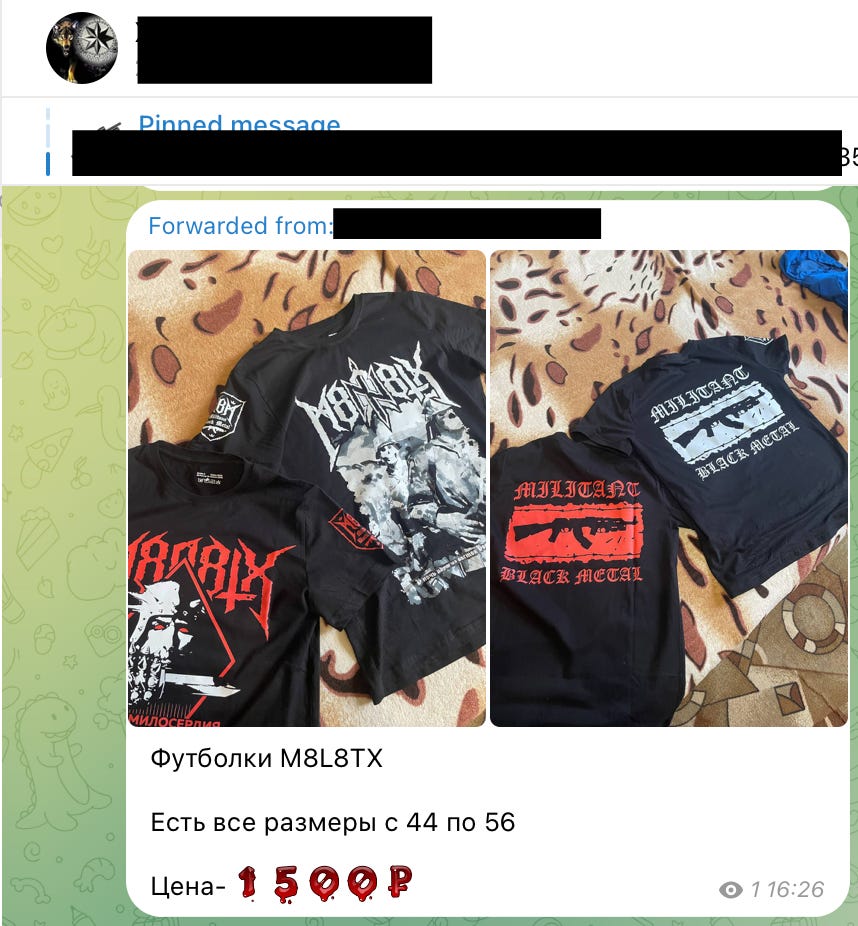Neo-Nazi Merchandise and Weapons for Sale: a Look at an International Extremist Supply Network
How a Telegram channel became a one-stop shop for neo-Nazi propaganda, weapons, and war-fueled radicalization.
A Telegram channel is openly promoting a dangerous blend of neo-Nazi paraphernalia and weaponry, effectively operating as a global black market for far-right extremism. Items listed for sale include flags, patches, clothing, and a wide array of firearms and explosives. The channel also claims to offer international shipping.
Among the weapons advertised are handguns, rifles, hand grenades, and even drone-dropped explosives. Many of the firearms are of Russian origin, particularly models produced by the Russian arms manufacturer “Kalashnikov Concern”. For instance, a Yarygin pistol—the standard sidearm of the Russian military—is priced at 7,500 rubles (around 80 euros), while a Saiga-12RP semi-automatic shotgun is offered for 17,000 rubles (about 180 euros).

User reviews indicate a link between the channel's operators and the neo-Nazi group WotanJugend. Buyers have reported receiving packages containing stickers with the group's logo, and WotanJugend flags and clothes are among the items for sale. WotanJugend was founded by Russian neo-Nazi Alexey Levkin, who relocated to Ukraine and became a prominent figure in the regional far-right scene. He is also the organizer of the Asgardsrei Festival, an annual far-right event showcasing National Socialist Black Metal (NSBM) bands.
Beyond its role as a weapons marketplace, the channel functions as a strategic propaganda hub—disseminating extremist culture to reinforce ideological cohesion and recruit new adherents. It distributes Nazi literature, amplifies content from other far-right organizations, and glorifies historical white supremacist figures. T-shirts of M8L8TH, a National Socialist black metal band co-founded by Levkin, are sold through the platform. M8L8TH functions as a musical and ideological extension of WotanJugend, using black metal to spread neo-Nazi ideology. Other items for sale include Nazi flags, helmets, and apparel emblazoned with fascist symbols.
A 2019 investigation by Bellingcat identified WotanJugend as a militant neo-Nazi organization with deep ties to international white supremacist networks. The group has collaborated with extremist organizations like the Misanthropic Division and leveraged conflict zones—particularly in Ukraine—as recruitment grounds and staging areas for their activities. Accurding to the Bellingcat report, Wotanjugend members were among Russian far-right nationalists who came to Ukraine to fight with far-right pro-Ukrainian forces, including the Azov Battalion.
Many of the weapons are sold at unusually low prices on the Telegram channel raise concerns about legitimacy. While some may suspect a scam, the large number of user reviews suggests the transactions are real. One explanation might be is that the weapons are being funneled from Russian military stockpiles, either stolen or illicitly diverted— looted from deceased Russian soldiers on the battlefield.
Another unresolved question is where the money from Telegram channel sales ultimately goes. Could the proceeds be funding far-right events, the WotanJugend group or supporting elements within the Azov movement?
What this Telegram channel reveals is more than just an illegal marketplace—it’s a window into the infrastructure of modern extremism. Ideology, weaponry, and propaganda are now bundled into digital storefronts, masked in anonymity, and shipped across borders. Tracking where the products go is difficult enough; understanding where the money ends up—and what violence it may ultimately support—is even harder. But one thing is clear: the convergence of hate and hardware online isn't just a fringe issue—it's a transnational threat hiding in plain sight.






